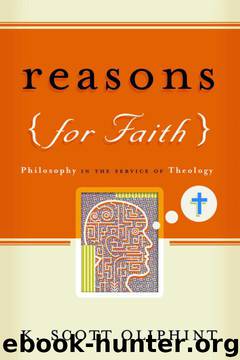Reasons for Faith: Philosophy in the Service of Theology by K. Scott Oliphint

Author:K. Scott Oliphint [Oliphint, K. Scott]
Language: eng
Format: epub
Tags: Philosophy
ISBN: 9780875526454
Amazon: B004LDLSMG
Barnesnoble: B004LDLSMG
Goodreads: 2292350
Publisher: P&R Publishing
Published: 2006-11-01T00:00:00+00:00
The Triune Essence
In attempting to do justice to (some kind of) impassibility of God, Creel considers it necessary to invent another metaphysical entity, the plenum, in order to guard against pantheism (thus allowing God to actualize possibilities that were not inherent in him). He has to, in the process of working this out, restrict God's own sovereignty, power, and knowledge (just to name a few attributes) in order to allow for the impassibility of God's will. Because possibility and actuality are, in this sense, more ultimate than God (in that God is dependent on them, and they are not an essential part of his character), creation becomes something that determines what God knows and when God knows it. This, in the name of impassibility.32
As we said, the problem is creation. This does not mean that creation per se is a problem. God saw all that he had made and it was very good. It means rather that the fact of creation and its status as created seem almost invariably to get in the way of clear, Christian thinking on these matters. From an essentially time-bound God to a metaphysical tertium quid, from a god who is (to a greater or lesser degree) essentially and hopelessly timeconditioned, to a metaphysical repository of passive potentialities, too many discussions about God and his relationship to creation conclude with a god who is in some way, like his creation, essentially needy. The triune God of Scripture takes a back seat to a host of wants, needs, and aspirations as philosophers and theologians, supposedly safeguarding intellectual respectability, debate his nature and character. Is there any way to maintain the integrity of the revelation of the triune God in the midst of such a bleak and anemic context?
Given what we saw earlier of van Inwagen's invitation, we are suggesting that a Christian theory of ultimate reality begin with the fundamental distinction between the triune God as he is in himself and creation as that which God produced and controls. Admittedly, such a beginning can take place only in a context in which God's revelation in Scripture provides the content of that starting point. And, admittedly again, that revelation is marginalized at best when many philosophers and theologians set their tasks with respect to theism.
But that need not be the case. As a matter of fact, given van Inwagen's admission, and given that philosophy has had a few thousand years of beginning its work with virtually every starting point but the basic truth provided in Scripture, a good argument could be made that a change of thinking is long overdue. It seems high time to introduce into the discussions something altogether different, perhaps aberrant, that can provide both for a discussion of the triune God of Scripture (who alone is the true God) and of our relationship to him. Perhaps a philosophical deracination is the order of the day.
We have thought about essentialism in the context of possible worlds. Though the language itself can at times obscure rather than clarify, the notion of possible worlds should not be seen as altogether inappropriate.
Download
This site does not store any files on its server. We only index and link to content provided by other sites. Please contact the content providers to delete copyright contents if any and email us, we'll remove relevant links or contents immediately.
The Secret Power of Speaking God's Word by Joyce Meyer(3148)
Signature in the Cell: DNA and the Evidence for Intelligent Design by Stephen C. Meyer(3118)
Real Sex by Lauren F. Winner(3000)
The Holy Spirit by Billy Graham(2933)
The Gnostic Gospels by Pagels Elaine(2515)
Jesus by Paul Johnson(2347)
Devil, The by Almond Philip C(2322)
23:27 by H. L. Roberts(2241)
The Nativity by Geza Vermes(2219)
Chosen by God by R. C. Sproul(2150)
All Things New by John Eldredge(2146)
Angels of God: The Bible, the Church and the Heavenly Hosts by Mike Aquilina(1948)
The Return of the Gods by Erich von Daniken(1925)
Angels by Billy Graham(1914)
Knowing God by J.I. Packer(1843)
Jesus of Nazareth by Joseph Ratzinger(1796)
The Gnostic Gospel of St. Thomas by Tau Malachi(1779)
Evidence of the Afterlife by Jeffrey Long(1773)
How To Be Born Again by Billy Graham(1773)
